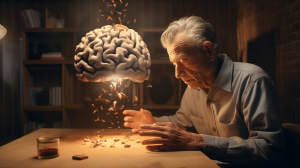Struggling with your memory? Looking to see if by chance you’re taking drugs that cause memory loss? Memory is our personal hard drive. Think of it as the vast storeroom of experiences, faces, emotions, and everything in between.
It’s essentially what makes us… well, us. Now, imagine introducing a software (in this case, drugs) that corrupts this hard drive. Frightening, isn’t it? The hidden price of some drugs is memory loss, a side effect we often don’t see coming. Let’s delve deeper into this topic of medications that may cause memory loss and shine a light on the drugs that have been found to do just this.
Contents
- 1 1. Benzodiazepines: The Common Culprit
- 2 2. Sleep Medications: The Silent Thieves
- 3 3. Antihistamines: More Than Just Allergy Relief
- 4 4. Narcotic Painkillers: The Opioid Epidemic’s Dark Side
- 5 5. Blood Pressure Drugs: Protecting the Heart, But at What Cost?
- 6 6. Antidepressants: The Mood-Lifting Memory Bandits
- 7 7. Antipsychotic Meds: A Double-Edged Sword
- 8 8. Chemotherapy Drugs: The Battle Inside
- 9 9. Diabetes Drugs: Sugar and Memory
- 10 10. Cholesterol-lowering Drugs: The Statin Situation
- 11 Noncognitive Symptoms Behavioral And Psychological
- 12 Cognitive Symptoms Memory and Thinking
- 13 Final Thoughts On Drugs That Cause Memory Loss
1. Benzodiazepines: The Common Culprit

Ever heard of Valium or Xanax? These are part of the benzodiazepines group. Used to treat anxiety, they can interrupt the transfer of events from short-term to long-term memory.
Benzodiazepines, colloquially known as “benzos,” are a class of drugs that have become ubiquitous in modern medicine, especially in the treatment of anxiety disorders, insomnia, seizures, and muscle tension. As popular as they are for their therapeutic effects, their relationship with memory and potential for addiction have made them equally infamous. Let’s dive into this further.
The Science Behind Benzos
Benzodiazepines work on the central nervous system by enhancing the effect of the neurotransmitter gamma-aminobutyric acid (GABA). By doing this, they slow down brain activity, leading to a calming effect. This is great for those suffering from severe anxiety or panic attacks. The brain, in its intricacy, has a balance between excitatory and inhibitory signals. Benzodiazepines tip this balance in favor of inhibition.
Benzos and Memory Loss
When we talk about memory loss linked to benzodiazepines, it primarily refers to anterograde amnesia. This is a condition where the individual struggles to remember new information after taking the drug. Think of it as having a memory “blackout.” The drug doesn’t typically erase old memories but makes it challenging to form new ones while under its influence.
This can manifest in various ways. Someone might forget a conversation they had while on the drug or misplace items without any recall of where they put them. For someone just experiencing these episodes, it can be quite alarming.
The Risk of Dependence
One of the significant concerns with benzodiazepines is their potential for dependence and addiction. The brain, being the adaptable organ it is, can get accustomed to the presence of benzodiazepines. Over time, the brain may crave the drug to function “normally,” leading to both physical and psychological dependence.
Stopping the drug suddenly can lead to withdrawal symptoms, which can range from mild anxiety to more severe symptoms like seizures. This is why it’s crucial for individuals on these drugs to work closely with their healthcare provider, especially if considering stopping the medication.
Finding a Balance
For many, benzodiazepines can be a lifeline. They can bring solace during crippling panic attacks or help insomniacs finally get a good night’s sleep. However, like all powerful tools, they come with their set of instructions and precautions.
If prescribed, it’s essential to take them as directed, be aware of their effects on memory, and regularly check in with a medical professional. Alternatives like cognitive behavioral therapy and other non-pharmacological treatments might also be explored as complements or substitutes, depending on the individual’s needs.
In a world increasingly acknowledging the importance of mental health, benzodiazepines remain a testament to the balance between treatment and side effects. As with all things, knowledge and awareness remain our best allies.
2. Sleep Medications: The Silent Thieves

Ambien, anyone? It’s a savior for insomnia sufferers, but there’s a catch. Some sleep medications can cause memory lapses, especially if taken in excessive amounts.
A good night’s rest is fundamental to our wellbeing. But in our modern age, where the pace is relentless and stress is ubiquitous, sleep can be elusive. Enter sleep medications, designed to lure us into the world of dreams when counting sheep doesn’t cut it. However, beneath their allure lies a clandestine reality: they can be silent thieves of memory. Let’s unwrap the mysteries surrounding these drugs.
The Allure of Sleep Aids
For those who’ve spent countless nights staring at the ceiling, the pull of sleep medications is undeniable. They promise a swift journey to dreamland, free from the shackles of insomnia. From over-the-counter aids to prescription solutions, the market is awash with options. Brands like Ambien (zolpidem) or Lunesta (eszopiclone) are household names.
How Sleep Meds Work
Most of these drugs fall under a category known as sedative-hypnotics. They act by slowing down brain activity, helping users drift off to sleep. Some mimic the action of GABA, much like benzodiazepines, but they’re designed to act more selectively and with fewer side effects.
Memory Lapses and Sleep Meds
Many users of sleep medications have reported events of which they have no memory. This phenomenon, known as “sleep-related complex behaviors,” can include activities like sleepwalking, sleep-eating, or even sleep-driving.
The medications can interfere with the stages of sleep, especially REM (rapid eye movement) sleep, a phase crucial for memory consolidation. When this stage is disrupted, the process of moving information from short-term to long-term storage is hampered.
Risks Beyond Memory
Aside from memory concerns, there are other risks. Some users report lingering drowsiness, which can be dangerous, especially when driving. There’s also the potential for dependency. Over time, the brain might crave the drug to achieve sleep, making it challenging to sleep naturally without the medication.
A Holistic Approach to Sleep
While sleep medications can be beneficial for many, especially in the short term or during acute bouts of insomnia, it’s worth exploring other avenues for sleep enhancement. This includes:
- Sleep hygiene: Creating a bedtime routine, keeping the room dark and cool, and avoiding screens before bedtime can make a significant difference.
- Natural remedies: Melatonin supplements, valerian root, and chamomile tea have been praised for their sleep-inducing properties.
- Cognitive Behavioral Therapy for Insomnia (CBT-I): This therapy helps address the underlying causes of sleep disturbances without medication.
Sleep medications, while a blessing for some, come with their set of caveats. The silent thievery of memory is just one aspect of a complex picture. As with all medications, awareness, moderation, and regular consultation with a healthcare provider are paramount. Before reaching for that pill bottle, perhaps it’s worth exploring other avenues or, at the very least, ensuring that we’re fully informed of the hidden costs. Sleep is sacred, after all.
3. Antihistamines: More Than Just Allergy Relief

Older antihistamines like Benadryl are known culprits. Sure, they battle allergies, but they can also affect the brain’s acetylcholine levels, impacting memory.
Yes, with the beauty of nature comes the dreaded hay fever. And many of us instinctively reach for antihistamines, the popular go-to for allergy relief. But there’s more to these drugs than just quelling sneezes. Notably, some of them have been linked to memory disturbances. Let’s delve into the lesser-known side of antihistamines.
A Quick Primer on Histamine and Antihistamines
Histamine is a compound released by cells in response to injury and allergic and inflammatory reactions, causing contraction of smooth muscle and dilation of capillaries. This reaction results in symptoms we associate with allergies: itching, sneezing, and a runny nose.
Antihistamines, as the name suggests, work against histamine. They block its actions, offering relief from these symptoms. There are two main categories: first-generation and second-generation antihistamines.
First-Generation Antihistamines: A Look Back
Drugs like Benadryl (diphenhydramine) belong to the first-generation category. They’ve been around for a long time and are available over-the-counter. Besides allergy relief, they’re also used as sleep aids due to their drowsiness-inducing side effect.
The Memory Conundrum
These first-generation antihistamines can cross the blood-brain barrier, an intricate filtration system. Once in the brain, they can affect the neurotransmitter acetylcholine, which plays a pivotal role in learning and memory. Reduced levels of acetylcholine have been associated with memory disturbances.
The result? Taking these drugs can lead to short-term memory issues. It can manifest as forgetfulness, feeling ‘foggy,’ or trouble recalling recent events.
Beyond Memory: Other Side Effects
Drowsiness, as mentioned, is a significant side effect. But there’s more: dry mouth, blurred vision, constipation, and urinary retention can also crop up. This is especially concerning for older adults, who might be on other medications and could be more susceptible to these side effects.
Second-Generation Antihistamines: A Safer Bet?
Newer antihistamines like Claritin (loratadine), Allegra (fexofenadine), and Zyrtec (cetirizine) belong to this category. They are less likely to induce drowsiness and, importantly, have a lesser effect on memory as they don’t cross the blood-brain barrier as readily.
Making Informed Choices
If you suffer from allergies, it’s not about avoiding antihistamines entirely. It’s about being informed. If memory or cognitive functions are a concern:
- Consider Second-Generation Options: As mentioned, they typically have fewer cognitive side effects.
- Limit Use: Use the medication only when necessary and avoid long-term usage without a doctor’s recommendation.
- Stay Informed: Always read the side effects on medication labels.
Antihistamines have revolutionized allergy treatment, turning what could be miserable days into ones of comfort. But, like all medications, they come with fine print. As we pop that pill to enjoy a sneeze-free day, it’s worth pausing to consider what else it might entail. After all, memory is one thing we don’t want to be allergic to!
4. Narcotic Painkillers: The Opioid Epidemic’s Dark Side

Pain – a universal human experience. For some, it’s a fleeting inconvenience; for others, it’s a relentless tormentor. Enter narcotic painkillers, or opioids, the powerful drugs championed for their unparalleled ability to suppress even the most excruciating pain. But this relief comes at a profound cost. Beyond addiction and overdose threats, drugs like morphine and codeine can affect cognitive functions and memory.
Let’s dive deeper into this dark underbelly.
Understanding Opioids
Opioids are derived from the opium poppy or synthesized to mimic its effects. Common names include morphine, oxycodone (OxyContin), hydrocodone (Vicodin), and the infamous fentanyl. They work by binding to opioid receptors in the brain, blocking pain signals and releasing a surge of dopamine – the pleasure neurotransmitter.
Memory Impairment: The Overlooked Effect
While the addictive potential of opioids is widely acknowledged, less discussed is their cognitive impact. Chronic opioid use can lead to:
- Anterograde Amnesia: Difficulty in forming new memories post-drug intake.
- Impaired Cognitive Functioning: Hindered ability to think, reason, and learn.
The reasons are multifold. Opioids can depress the central nervous system, slowing brain activity. Additionally, they might indirectly influence memory by disrupting sleep patterns, a crucial time for memory consolidation.
Addiction: A Quick Descent
The brain quickly acclimates to the pleasure opioids provide, craving more of the drug to achieve the same euphoria – a phenomenon known as tolerance. This can lead users down a perilous path:
- Increased Dosages: To achieve the same pain relief or euphoria.
- Physical Dependence: The body needs the drug to feel ‘normal.’
- Withdrawal Symptoms: Ceasing intake can lead to painful physical and emotional symptoms.
The Deadly Toll: Overdose
Opioid overdose is an all-too-frequent consequence of misuse. It occurs when taken in a quantity that suppresses the central nervous system to a point where vital functions, like breathing, slow down or stop. Fentanyl, in particular, is notorious for its potency and narrow therapeutic window, making overdoses more common.
The Social Ripple Effect
The opioid epidemic isn’t just a medical issue; it’s a societal one. Communities are devastated by the ripple effects:
- Broken Families: Addiction can tear apart familial structures.
- Economic Strain: From lost workdays to healthcare costs.
- Criminal Activity: To finance their habit, some resort to illegal means.
Finding Solutions
Combating the opioid crisis requires a multi-pronged approach:
- Prescribing Judiciously: Ensuring opioids are prescribed only when truly necessary.
- Education: Informing patients about the risks associated with opioid usage.
- Alternative Pain Management: Exploring non-opioid pain relief methods.
- Treatment Programs: Establishing robust rehabilitation and support systems for those addicted.
Narcotic painkillers, while powerful allies against pain, have unleashed a Pandora’s box of challenges. The opioid epidemic, with its staggering toll on individual lives and the fabric of society, underscores the adage that sometimes the cure can be worse than the disease. As we grapple with this crisis, it’s a poignant reminder of the delicate balance between alleviation and addiction, between relief and ruin.
5. Blood Pressure Drugs: Protecting the Heart, But at What Cost?

Beta-blockers, especially older ones, can interfere with certain neurotransmitters, potentially leading to memory issues. High blood pressure, often dubbed the “silent killer”, is a malady that affects millions worldwide. Left unchecked, it’s a ticket to a host of cardiovascular issues – strokes, heart attacks, and more.
Enter blood pressure drugs, the pharmaceutical knights in shining armor. They’re indispensable in the fight against this condition, yet they come with their own set of caveats, including a potential impact on memory. Let’s explore the dual nature of these medications.
Hypertension: A Brief Overview
Before diving deep, it’s essential to grasp what hypertension is. Simply put, it’s when the force of blood against the walls of your arteries remains too high for too long. Persistent hypertension can damage arterial walls and strain the heart.
The Medicinal Arsenal Against Hypertension
There’s a wide array of drugs to treat high blood pressure, including:
- Diuretics: Help kidneys eliminate sodium and water, reducing blood volume.
- Beta-blockers: Make the heart beat slower and with less force.
- ACE inhibitors: Block the formation of a natural peptide that narrows blood vessels.
- Calcium channel blockers: Prevent calcium from entering the smooth muscle cells of the heart and arteries.
Cognitive Concerns: A Silent Side Effect?
Some studies have indicated a potential link between certain antihypertensive drugs and cognitive decline. Here’s the breakdown:
- Beta-blockers: Some older, “non-selective” beta-blockers are thought to have the potential to affect cognition. These drugs might cross the blood-brain barrier, leading to memory disturbances.
- Diuretics: There’s some evidence suggesting that overuse might alter electrolyte balances, impacting brain function.
However, it’s crucial to note that the evidence is mixed. Some studies even suggest that controlling blood pressure with these drugs could reduce the risk of dementia in the long run.
Other Side Effects to Consider
While the memory debate is ongoing, there are more immediate, well-documented side effects associated with these drugs:
- Diuretics: Frequent urination, electrolyte imbalances, and fatigue.
- Beta-blockers: Fatigue, cold hands and feet, and weight gain.
- ACE inhibitors: Persistent dry cough, elevated blood potassium levels, and dizziness.
Navigating the Treatment Maze
Considering the potential side effects, what’s a patient to do? Here are some recommendations:
- Open Dialogue with Doctors: Regularly discuss any side effects or concerns.
- Monitor Blood Pressure: Keeping track helps adjust doses or switch medications if needed.
- Lifestyle Choices: Often, lifestyle changes, like diet and exercise, can reduce the need for medication or complement its effects.
Blood pressure drugs, like all medications, are a balancing act between benefits and risks. While they provide undeniable cardiovascular protection, the potential cognitive implications (though not conclusively proven) remind us to tread with awareness. The quest for heart health, it seems, isn’t just about the beat and rhythm but ensuring the mind remains harmoniously in tune.
6. Antidepressants: The Mood-Lifting Memory Bandits

Some antidepressants have been linked to short-term memory problems. It’s a balancing act between emotional and cognitive health.
In the labyrinth of mental health, depression stands as a towering minotaur – overwhelming, persistent, and deeply challenging. Antidepressants, for many, act as the guiding thread, leading individuals out of the maze of darkness and despair. But as with most powerful tools, there’s a caveat. While these drugs uplift moods, some users report memory concerns. Let’s navigate the intricate relationship between antidepressants and cognitive function.
The Many Faces of Depression
At its core, depression is a mood disorder marked by prolonged feelings of sadness, hopelessness, and a lack of interest or pleasure in activities. However, it’s not a singular entity. It manifests in various forms, from major depressive disorder to dysthymia and seasonal affective disorder.
Antidepressants: A Glimpse into the Arsenal
The world of antidepressants is vast and varied:
- Selective Serotonin Reuptake Inhibitors (SSRIs): Prozac (fluoxetine) and Zoloft (sertraline) are popular choices. They increase serotonin levels in the brain, a neurotransmitter linked to mood, sleep, and memory.
- Serotonin-Norepinephrine Reuptake Inhibitors (SNRIs): Examples include Cymbalta (duloxetine) and Effexor XR (venlafaxine). They affect both serotonin and norepinephrine neurotransmitters.
- Tricyclic Antidepressants: Older drugs like amitriptyline belong to this group. They influence several neurotransmitters but come with more side effects.
The Memory Quandary
Many people on antidepressants report “brain fog,” a feeling of cognitive sluggishness. Here’s the possible connection:
- Direct Drug Effects: Some antidepressants, especially older ones, can cause short-term memory issues, making it hard to remember names or why you walked into a room.
- Indirect Effects: Poor sleep, another side effect of antidepressants, can hinder memory. Moreover, anxiety and depression itself can impact cognitive function, making it tricky to pinpoint the exact cause.
A Deeper Dive into SSRIs
These are among the most commonly prescribed antidepressants today. Their impact on memory can be two-fold:
- Acute Effects: Shortly after taking the medication, some individuals may experience impaired short-term memory and difficulty in processing information.
- Long-term Use: Chronic use of SSRIs might lead to structural and functional changes in the brain, potentially affecting memory processes.
Navigating the Trade-offs
It’s essential to recognize that while some people experience memory concerns, many others find that their cognitive abilities remain stable or even improve due to alleviated depression. Here’s how to manage potential memory issues:
- Regular Check-ins: Discuss any cognitive changes with your healthcare provider.
- Holistic Treatment: Combine medication with psychotherapy or cognitive behavioral therapy.
- Brain-Boosting Activities: Engage in puzzles, reading, and memory-enhancing games.
Antidepressants, while transformative for many, come with their own set of complexities. Memory disturbances, whether directly attributed to the medication or a combination of factors, are a concern for some users. But in the vast, often shadowy realm of mental health, the most critical compass is an informed, proactive approach, balanced with a touch of patience. As the adage goes, “knowledge is power,” and in the context of antidepressants, it could also mean clarity.
7. Antipsychotic Meds: A Double-Edged Sword

Delving into the world of mental health, antipsychotic medications emerge as powerful allies for many, particularly those battling severe mental disorders like schizophrenia or bipolar disorder. These drugs, in many cases, are life-transformers, offering stability in a storm of psychosis.
However, like a blade that cuts both ways, antipsychotics also bring along a slew of side effects, including potential memory disruptions. Let’s embark on a journey through the nuanced landscape of these impactful drugs.
The Reality of Psychosis
Psychosis paints a person’s world with hallucinations, delusions, and often, a break from reality. The origins can range from schizophrenia, bipolar disorder, severe depression, or even substance-induced episodes.
Antipsychotics at a Glance
Broadly, antipsychotic medications fall into two categories:
- Typical (First-Generation) Antipsychotics: Drugs like Haloperidol or Thorazine, which primarily target dopamine receptors in the brain, fall under this umbrella. They’ve been in use since the mid-20th century.
- Atypical (Second-Generation) Antipsychotics: These, such as Risperdal (risperidone), Abilify (aripiprazole), and Seroquel (quetiapine), are newer and affect both dopamine and serotonin levels.
The Cognitive Dilemma
Antipsychotics, while battling psychotic symptoms, have been linked to cognitive side effects, particularly concerning memory. Here’s a deeper dive:
- Impaired Working Memory: Working memory, the ability to hold and manipulate information over short periods, can be compromised. This could manifest as difficulty following conversations or completing tasks.
- Attention Deficits: Some individuals may find it harder to focus or get easily distracted.
- Slowed Processing Speed: Tasks that require quick thinking, like mental arithmetic or decision-making, might become challenging.
However, it’s essential to recognize that some cognitive symptoms might be a byproduct of the underlying disorder rather than the medication itself.
Additional Side Effects to Note
Beyond potential memory issues, antipsychotics carry other side effects:
- Metabolic Changes: Weight gain, increased cholesterol, and diabetes risks are associated with some antipsychotics.
- Extrapyramidal Symptoms: Movement disorders, like tremors or stiffness, can arise, especially with typical antipsychotics.
- Tardive Dyskinesia: This involves involuntary muscle movements, often around the mouth, and can be irreversible.
Walking the Tightrope
For those prescribed antipsychotics, it’s a careful balance between managing psychotic symptoms and handling side effects. Here are some ways to traverse this delicate path:
- Regular Consultations: Consistent dialogue with healthcare professionals can help monitor and adjust dosages.
- Cognitive Training: Some therapies and exercises can enhance cognitive function and memory.
- Healthy Lifestyle Choices: Regular physical activity, a balanced diet, and adequate sleep can counteract some side effects.
Antipsychotic medications, while invaluable in treating severe mental disorders, do not come without their challenges. They underscore the complexities of brain chemistry and the quest for mental equilibrium. For patients and healthcare professionals alike, understanding this double-edged sword is crucial. Because while the blade might be sharp, with care and knowledge, it can be wielded with precision and purpose.
8. Chemotherapy Drugs: The Battle Inside

For those faced with the ominous shadow of cancer, chemotherapy often emerges as a beacon of hope. These potent drugs are an integral part of the modern-day arsenal against this formidable foe. Yet, like soldiers causing unintended collateral damage in the heat of battle, chemotherapy drugs can have profound impacts on the body, including cognitive function. Let’s voyage into the intricate dance of chemotherapy and its influence on the mind and memory.
Understanding Chemotherapy
At its essence, chemotherapy targets and destroys rapidly dividing cells, a hallmark of cancerous growths. However, this approach isn’t discriminating, which means that healthy, fast-dividing cells, such as those in our hair, gut, and bone marrow, are also vulnerable.
The Phenomenon of ‘Chemo Brain’
Among the tapestry of side effects that chemotherapy can weave, cognitive changes have become a topic of increasing attention. Often dubbed “chemo brain,” this syndrome includes:
- Memory Lapses: Patients might forget names, misplace items, or struggle to recall familiar words.
- Difficulty Concentrating: Tasks that once felt mundane, like reading a book or watching a film, might become challenging to focus on.
- Slowed Processing Speed: Thinking may seem slower, making multitasking or rapid decision-making more strenuous.
Why Does Chemo Brain Occur?
The mechanisms behind this phenomenon remain under investigation, but several theories are proposed:
- Direct Drug Effects: Chemotherapy drugs might have direct neurotoxic effects on the brain, leading to cognitive changes.
- Inflammatory Response: The body’s inflammatory response to chemotherapy might contribute to cognitive symptoms.
- Hormonal Fluctuations: As some chemotherapy drugs affect hormone-producing organs, hormonal imbalances might be at play.
Navigating the Cognitive Storm
For those experiencing chemo brain, the journey can feel isolating. However, there are strategies to cope:
- Cognitive Rehabilitation: Occupational therapists or psychologists can offer exercises to enhance memory and focus.
- Lifestyle Tweaks: Regular sleep, physical activity, and mental exercises like puzzles can provide some relief.
- Open Dialogue: Discussing symptoms with healthcare professionals can lead to tailored strategies or even medication adjustments.
Beyond the Brain: Other Side Effects
Chemotherapy’s reach extends beyond cognition:
- Physical Fatigue: A pervasive tiredness, often unalleviated by rest, is common.
- Nausea and Vomiting: Digestive disturbances are frequent companions of chemotherapy.
- Hair Loss: The rapid division of hair follicle cells makes them a target.
In the grand theater of cancer treatment, chemotherapy remains a linchpin. But its impacts, particularly on cognitive function, serve as a poignant reminder of the sacrifices made in the war against cancer. While the battle rages inside, understanding, compassion, and adaptive strategies are our best allies, ensuring that in the pursuit of life, quality isn’t left behind.
9. Diabetes Drugs: Sugar and Memory
Certain drugs that control blood sugar levels in diabetes patients have been found to affect memory. More research is needed, but the connection is there. While this condition primarily revolves around blood sugar levels, its reach extends far beyond glucose management.
Among its many ripples, the relationship between diabetes, its medications, and cognitive function is both intriguing and complex. Let’s journey through the intricate bond between diabetes drugs and memory.
The Diabetes Spectrum
Diabetes, broadly categorized into Type 1 and Type 2, is marked by an inability to regulate blood sugar effectively:
- Type 1 Diabetes: The body’s immune system mistakenly attacks insulin-producing cells, requiring lifelong insulin therapy.
- Type 2 Diabetes: Insulin resistance is the hallmark, where the body can’t use insulin efficiently. Over time, insulin production can also decline.
Blood Sugar: The Brain’s Fuel
Glucose is the brain’s primary energy source. Both excessively high (hyperglycemia) and low (hypoglycemia) blood sugar levels can influence cognitive function:
- Hyperglycemia: Chronic high sugar levels can damage blood vessels, affecting oxygen and nutrient supply to the brain, potentially impairing memory and cognitive skills.
- Hypoglycemia: Low sugar levels can starve the brain of its essential fuel, leading to confusion, dizziness, and even unconsciousness in severe cases.
Diabetes Drugs: A Two-Edged Sword
While diabetes medications aim to stabilize blood sugar, they come with potential memory-related implications:
- Insulin: Essential for Type 1 and sometimes prescribed for Type 2, excessive doses can lead to hypoglycemia with its associated cognitive effects.
- Metformin: A cornerstone for Type 2 diabetes, there have been mixed reports about its impact on cognition. Some studies suggest potential protective effects against Alzheimer’s, while others hint at possible memory concerns.
- Sulfonylureas: Drugs like glipizide stimulate insulin production but carry the risk of hypoglycemia, with its associated cognitive challenges.
- GLP-1 Receptor Agonists: Medications like liraglutide may offer neuroprotective benefits, reducing the risk of cognitive decline.
Navigating the Glycemic Terrain
Managing diabetes while preserving cognitive health involves a delicate balance:
- Frequent Monitoring: Regular blood sugar checks can prevent extreme fluctuations, safeguarding cognitive function.
- Holistic Management: Incorporating diet, exercise, and stress-reducing techniques alongside medications can offer comprehensive protection.
- Open Conversations: Discuss any cognitive or memory concerns with healthcare providers to tweak medication regimens or introduce supportive strategies.
The Broader Picture: Diabetes and Brain Health
Diabetes has been linked to an increased risk of various brain disorders, including dementia and Alzheimer’s disease. The reasons span from vascular damage, inflammation, to direct effects of high sugar on brain structures.
The dance between diabetes drugs and memory underscores the intricate interplay between our body’s systems and the medications intended to regulate them. In the quest to manage blood sugar, it’s pivotal to ensure the mind doesn’t pay an unintended price. After all, in the tapestry of health, every thread — from glucose molecules to neural pathways — is invaluable.
10. Cholesterol-lowering Drugs: The Statin Situation
Cholesterol: often villainized in health narratives, yet undeniably vital to our body’s function. Enter statins, the frontline warriors in the fight against high cholesterol levels and cardiovascular diseases. But as with many battles, there are unintended consequences.
In the spotlight here is the discourse around statins and their potential impacts on cognition and memory. Let’s delve into the statin situation.
Cholesterol: A Quick Primer
Cholesterol is a waxy, fat-like substance present in every cell of our bodies. While it’s essential for creating hormones, vitamin D, and aiding digestion, too much in the bloodstream can lead to plaque formation, narrowing arteries and increasing heart disease risk.
Statins: The Good, the Bad, and the Controversial
Statins, such as atorvastatin (Lipitor), simvastatin (Zocor), and rosuvastatin (Crestor), function by inhibiting an enzyme in the liver responsible for cholesterol production:
- The Good: Statins are remarkably effective in reducing LDL (the “bad” cholesterol) levels, diminishing heart attack risks and strokes in high-risk patients.
- The Bad: Muscle pain, liver damage, and increased blood sugar levels leading to type 2 diabetes risk are some known side effects.
- The Controversial: Over the years, concerns have arisen about statins’ possible link to memory loss and cognitive decline.
Memory Matters: Making Sense of Mixed Signals
Multiple studies and reviews have attempted to decipher the statin-memory conundrum:
- Short-term Memory Loss: Some statin users have reported transient memory lapses or confusion. Interestingly, these symptoms were reversible upon discontinuation of the drug.
- Cognitive Decline and Dementia: While earlier concerns existed, most contemporary large-scale studies and reviews suggest no significant association between statin use and long-term cognitive decline or dementia risk. Some studies even propose potential protective effects!
- Underlying Mechanisms: The science is still out on why some users experience these effects. Theories range from reduced cholesterol affecting brain function to statins influencing neurotransmitter production.
Navigating the Statin Pathway
For those on statins or considering them, an informed approach is crucial:
- Risk vs. Reward: Weigh the undeniable cardiovascular benefits against potential side effects. For many, the heart health advantages overwhelmingly surpass the risks.
- Open Dialogue: Experience memory changes? Discuss with your doctor. Adjustments in dosage or a switch to another statin can sometimes alleviate symptoms.
- Lifestyle Emphasis: A heart-healthy lifestyle, including a balanced diet, regular exercise, and avoiding smoking, can support and even amplify statin benefits.
Looking Beyond the Hype
Statins, due to their widespread use and media attention, are often under the scanner. It’s essential to differentiate between anecdotal experiences and broad scientific consensus.
In the vast realm of cardiovascular health, statins have carved a significant niche. Their potential cognitive effects, while not conclusively negative, deserve attention and ongoing research. As we navigate the intertwined paths of heart health and brain function, the statin situation serves as a poignant reminder of medicine’s complexities and the continual quest for comprehensive well-being.
Noncognitive Symptoms Behavioral And Psychological

The term ‘cognition’ typically brings to mind processes such as memory, attention, and problem-solving. However, when discussing conditions like dementia or other neurological disorders, the narrative extends beyond just cognitive symptoms.
A significant part of the challenge—and often the most distressing for caregivers and loved ones—are the noncognitive symptoms, specifically the behavioral and psychological symptoms of dementia (BPSD). Let’s unravel this often overlooked, yet critical aspect of neurocognitive disorders.
What Are Noncognitive Symptoms?
While cognitive symptoms relate to mental processes like thinking, reasoning, and remembering, noncognitive symptoms pertain to mood, behavior, and emotions. These can manifest as:
- Mood disturbances such as depression and anxiety.
- Behavioral challenges like aggression, wandering, or disinhibition.
- Psychotic symptoms including hallucinations or delusions.
The Spectrum of Behavioral and Psychological Symptoms
- Agitation and Aggression: Manifests as restlessness, irritability, or even verbal and physical aggression.
- Depression and Apathy: Feelings of sadness, tearfulness, lack of motivation, or loss of interest in previously enjoyed activities.
- Anxiety: Excessive worry, resistance to changes in routine, or fear of new environments.
- Psychotic Symptoms: This includes hallucinations (usually visual) and delusions which are often paranoid in nature, such as the belief that one’s belongings are being stolen.
- Sleep Disturbances: Difficulty falling asleep, waking up frequently at night, or becoming active during nighttime hours.
- Wandering: Aimless wandering, which can be particularly concerning due to the risks it poses.
Root Causes and Triggers
The origins of these behavioral and psychological symptoms can be multifaceted:
- Neurological Changes: Alterations in the brain due to diseases like Alzheimer’s can directly lead to these symptoms.
- Environmental Factors: Unfamiliar or overstimulating environments can be disorienting.
- Physical Discomfort: Conditions like infections, constipation, or even poor eyesight can exacerbate behavioral issues.
- Medications: Some drugs can have side effects that manifest as behavioral or psychological symptoms.
Management and Intervention
- Person-centered Care: Tailoring care to individual needs and preferences can reduce distress.
- Environmental Modifications: Simplifying the environment, improving lighting, or reducing noise can be beneficial.
- Behavioral Therapies: Techniques like redirection, validation therapy, or reminiscence therapy can be effective.
- Medication: In some cases, antipsychotic medications or mood stabilizers may be prescribed, but they come with their own set of risks.
The Importance of Caregiver Support
Given the challenging nature of these symptoms, caregiver burnout is a real concern. Access to resources, respite care, and support groups can be immensely beneficial.
While cognitive decline remains at the forefront of discussions on neurocognitive disorders, the noncognitive, behavioral, and psychological symptoms often dictate the quality of life for both individuals and their caregivers.
Understanding, patience, and a multi-faceted approach are crucial in navigating these tumultuous waters, emphasizing that comprehensive care goes beyond the cognitive, delving deeply into the realms of behavior and emotion.
Cognitive Symptoms Memory and Thinking

The realm of cognition is vast and intricate, constituting the cornerstone of our mental faculties. It encompasses a variety of functions, from memory recall to intricate problem-solving.
However, when disturbances occur within this realm—whether due to neurological disorders, aging, or other factors—the ripple effects are profound, affecting not just the individual but also their social fabric.
Let’s delve deeper into the realm of cognitive symptoms, focusing particularly on memory and thinking.
The Foundations of Cognition
Cognition refers to the mental processes that enable us to carry out tasks, make decisions, and interact with our environment. Within this vast category, memory and thinking stand out as pivotal:
- Memory: Our ability to store, retain, and later retrieve information. It can be further subdivided into:
- Short-term Memory: Holds temporary information.
- Long-term Memory: Stores information for extended durations.
- Working Memory: Processes and manipulates temporary information.
- Thinking (Cognitive Skills): These skills allow us to process information, solve problems, make decisions, and create new ideas. This encompasses:
- Attention: Focusing on specific stimuli or tasks.
- Reasoning: Logical thinking to make conclusions.
- Judgment: Making decisions based on analysis.
Spotting Disturbances in Memory and Thinking
- Forgetfulness: Beyond the occasional misplaced keys, consistent forgetfulness—like missing appointments or repeating questions—can be indicative of deeper cognitive issues.
- Difficulty with Familiar Tasks: Struggling with previously routine activities, such as brewing coffee or using a phone.
- Language Challenges: Forgetting common words or substituting inappropriate ones.
- Disorientation: Not recognizing familiar places or losing track of dates and time.
- Impaired Judgment: Making poor decisions, like giving away money inappropriately.
- Abstract Thinking Problems: Struggling with concepts like numbers or symbols.
Potential Causes of Cognitive Disturbances
- Neurodegenerative Diseases: Alzheimer’s disease, Parkinson’s, and other forms of dementia directly impact cognitive functions.
- Traumatic Brain Injuries: Concussions or other head injuries can lead to cognitive impairment.
- Mental Health Disorders: Depression, anxiety, and schizophrenia can have cognitive symptoms.
- Medications and Drugs: Some medications or substance abuse can impact memory and thinking.
- Other Medical Conditions: Thyroid problems, infections, or vitamin deficiencies can also be culprits.
Approaches to Manage and Support
- Cognitive Rehabilitation: Structured therapies aimed at improving cognitive functions or compensating for cognitive deficits.
- Medications: Certain drugs can slow cognitive decline in conditions like Alzheimer’s.
- Lifestyle Measures: Regular exercise, a balanced diet, cognitive stimulation (like puzzles), and social interaction can support cognitive health.
- Adaptive Techniques: Using reminders, calendars, and notes to compensate for memory challenges.
The symphony of memory and thinking is central to our essence, shaping our interactions, experiences, and identity. Recognizing disturbances in this symphony and understanding their nuances empowers us to seek timely interventions, ensuring that the richness of cognition—its highs, lows, intricacies, and simplicities—continues to illuminate the human experience.
Final Thoughts On Drugs That Cause Memory Loss
While many drugs serve crucial roles in managing and treating conditions, we can’t ignore the hidden price tag attached: potential memory loss. In our quest for relief and healing, it’s essential to be informed, have open conversations with healthcare professionals, and weigh the pros and cons.
Just as you wouldn’t want to buy a product without reading its side effects, the same goes for medications. So, the next time you pop that pill, remember (pun intended) to be in the know, as now you know the drugs that cause memory loss.






































